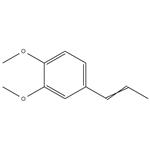Isoeugenyl methyl ether has a delicate, clove-carnation odor and
a burning bitter taste. May be prepared by methylation of isoeugenol with methyl sulfate in alkaline solution.
Isoeugenol Methyl Ether occurs
in small quantities in several essential oils. It is a colorless to pale yellow liquid
with a mild clove odor.
The natural and the commercial products are a mixture of cis- and trans-isomers; originally isolated in the oil
roots of Asarum arifolium Michx.; in the oil of Cymbopogon javanensis, Orthodon methylisoeugenoliferum F. (approx. 53%) and
others. Reported found in orange peel oil, ginger, calamus, dried bonito and mastic gum leaf and fruit oil.
Perfumery, flavoring agent.
Methyl isoeugenol can be used as a natural food flavor in food industries.
ChEBI: Isomethyleugenol is a phenylpropanoid, an olefinic compound and a dimethoxybenzene.
By methylation of isoeugenol with methyl sulfate in alkaline solution
The acute oral LD50 in rats was reported as 1.5 g/kg (Jenner, Hagan, Taylor, Cook & Fitzhugh, 1964) and as 2.5 g/kg (2.03-3.08 g/kg) (Keating, 1972). The ip LD50 in mice was reported as 0.5 g/kg for the eis- isomer and as 0.35 g/kg for the trans- isomer (Caujolle & Meynier, 1960). The acute dermal LD50 in rabbits exceeded 5 g/kg (Keating, 1972)
Methyl isoeugenol is one of the main components found in the essential oil extracted from Acorus calamus, bark of Croton malambo and rhizomes of Zingiber zerumbet, Hedychium coronarium and Etlingera cevuga.



